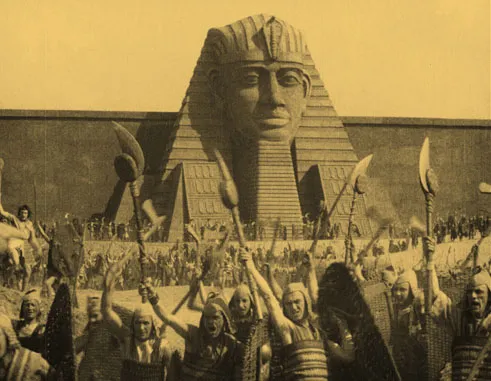Lost and Found: HBO and Ernst Lubitsch
A periodic update of film preservation projects
/https://tf-cmsv2-smithsonianmag-media.s3.amazonaws.com/filer/20110909071010Lost-Found-Pharaoh-Jannings-small.jpg)
Lost
If it’s surprising how ephemeral film can be, survival rates for video processes are even more alarming. Primarily to save money, many networks routinely erased programs to re-use videotape. As a result, the roll call of missing television programs includes sporting events like World Series and Super Bowls; episodes of The Tonight Show and soap operas like Search for Tomorrow; and almost all of the output from the DuMont Television Network. The Paley Center for Media devotes this site to “lost” radio and television programs.
While preparing for HBO’s 40th anniversary, archivists found enormous gaps in HBO Sports programming. As Max Segal, Curator/HBO Sports, wrote me in an e-mail, “We have searched multiple HBO libraries and databases and finding much of our Sports programs from 1972-75 are just not there.”
Today Mr. Segal sent out this update:
The big challenge regarding early HBO Sports programming is 1972-75. Most of our sports programs from 1972-77 came from Madison Square Garden. They have no video from this time period. We have reached out to the sports leagues and promoters of our 1970’s programs. They have no video from this time period either.
What we have pieced together so far:
• originally tapes were stored at HBO Studios on 23rd Street, NYC
• in the 80’s, long-term storage was shifted to Bonded
• Tapes went regularly missing at Bonded and a decision was made to leave Bonded
• In 1991, HBO reels were moved to Preferred Media Storage, where they are today
• No one at Madison Square Garden has clues to where there the two-inch reels went.
For added perspective, two-inch reels were very expensive, especially for a start-up network. It was common practice for all networks, including HBO, to either sell-off once used two-inch reels or simply record over them. The positive is, HBO regularly made 3/4 inch screeners of our early 70′s programs, as many as 20 copies per program:
• We were able to recover two 70′s college basketball games from announcer Len Berman this way.
• Sports Director Brad Schreiber had about 10 boxes of these original 1970′s 3/4 inch screeners. He junked them 13 years ago.
• Spencer Ross had a storage unit full of 1970′s 3/4 inch reels. He got rid of them about 7 years ago.
If three people saved early 70′s HBO programs, others must have too.
We need clues of what happened or who may still have any personal copies of 1972-75 HBO Sports programming, either on original two inch or more likely, three quarter inch screeners.
We need help from good detectives.
Help us keep hope alive.
If you have any information, contact Max Segal at [email protected]. Interested readers can obtain a breakdown of the 1972-76 Sports Programming from him.

Found
The past twelve months have seen some major rediscoveries, including Upstream, a comedy-drama with a theatrical setting by John Ford, and The White Shadow, the earliest surviving credit for Alfred Hitchcock. Now comes word of a newly restored feature from Ernst Lubitsch, a director prized in the 1930s for his sly sophistication.
The son of a tailor, Lubitsch made his reputation in Germany, where he was known for broad comedies and big-budget historical dramas like Madame Du Barry (1919, titled Passion in the US) and Anna Boleyn (1920, Deception in the US). He formed his own production company to make Das Weiss des Pharao/The Loves of Pharaoh (1922), and poured money into the project, in part to impress Hollywood. In fact this would be Lubitsch’s last European film before heading to the United States. After a troubled stint with Mary Pickford, and an expensive one at Warner Bros., he hit his stride in Hollywood at Paramount, where he made ground-breaking musicals like One Hour with You and the romantic comedy Trouble in Paradise. He was the director behind Ninotchka, the MGM hit in which “Garbo laughs,” as well as The Shop Around the Corner, a timeless classic about mismatched pen pals who fall in love (later reimagined by Nora Ephron as You’ve Got Mail).
Although a success on its release, The Loves of Pharaoh seemingly disappeared in the 1930s. A tinted nitrate print turned up in the Russian Gosfilmfond archive, and later a fragment was found in a collection now held at the George Eastman House. Thomas Bakels of Alpha-Omega Digital GmbH spent years assembling and digitally scanning the prints as well as overseeing a new orchestral recording of Eduard Künneke’s original score.
Dennis Doros of Milestone Film & Video saw a sneak preview of the nearly completed restoration and wrote in an e-mail: “Thomas did an exceptional job putting all the pieces together (there were a lot). It is minor Lubitsch if you’re looking for ‘the touch.’ However, as a calling card to Hollywood (Lubitsch showing he can do Reinhardt-Griffith-DeMille-like grand spectacle) and the coincidence that 1922 was the finding of King Tut’s tomb, it’s all pretty cool. I had a fun time watching it.”
Starring Emil Jannings, the first man to win a Best Acting Oscar, The Loves of Pharaoh will screen at the Egyptian Theater in Los Angeles on October 18 prior to its release on DVD and Blu-Ray.
/https://tf-cmsv2-smithsonianmag-media.s3.amazonaws.com/accounts/headshot/daniel-eagan-240.jpg)
/https://tf-cmsv2-smithsonianmag-media.s3.amazonaws.com/accounts/headshot/daniel-eagan-240.jpg)